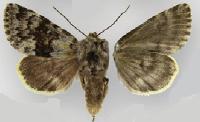
Lasionycta is a genus of moths of the family Noctuidae.

Catocala benjamini, or Benjamin's underwing, is a moth of the family Erebidae. The species was first described by Auburn Edmund Brower in 1937. It is found in the US states of Arizona, Nevada, southern California and southern Utah.

Lasionycta staudingeri is a moth of the family Noctuidae. It can be found from Oppland to Finland and Norway in Europe, as well as Siberia and North America.
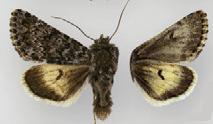
Lasionycta leucocycla is a moth of the family Noctuidae. It can be found in Scandinavia, Siberia and northern North America.

Lasionycta secedens is a moth of the family Noctuidae. It has a Holarctic distribution. North American populations are distributed from Labrador, northern Manitoba, and Alaska, southward to northern Maine, northern Minnesota, and south-central British Columbia. Subspecies bohemani occurs in northern Eurasia, Alaska and Yukon.
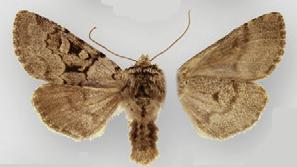
Lasionycta conjugata is a moth of the family Noctuidae. It is found in the Rocky Mountains from central Utah and Colorado north to the Beartooth Plateau on the Montana-Wyoming border.

Lasionycta poca is a moth of the family Noctuidae first described by William Barnes and Foster Hendrickson Benjamin in 1923. It is found throughout the Rocky Mountains of Alberta, westward to the Coast Range in western British Columbia and southward in the Cascades to Okanogan County, Washington.

Lasionycta perplexa is a moth of the family Noctuidae. It is widely distributed from southern Alaska and Yukon in the north to California, Utah, and Colorado in the South. A disjunct population is found on the east coast of Hudson Bay at Kuujjuaraapik.

Lasionycta subalpina is a moth of the family Noctuidae. It is found from southern Idaho and the Beartooth Plateau on the Montana-Wyoming border to Colorado and central Utah as well as in the Sierra Nevada of California.
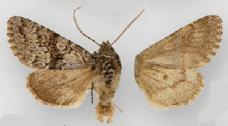
Lasionycta subfuscula is a moth of the family Noctuidae. It is found from south-western British Columbia and south-western Alberta south to southern Oregon in the west and to southern Colorado and Utah in the Rocky Mountains.

Lasionycta dolosa is a moth of the family Noctuidae first described by William Barnes and Foster Hendrickson Benjamin in 1923. It is found in the Rocky Mountains of Colorado.

Lasionycta quadrilunata is a moth of the family Noctuidae. It is found from south-central Alaska down the spine of the Rocky Mountains to Colorado.

Lasionycta uniformis is a moth of the family Noctuidae. It is widely distributed in the mountains of western North America. It occurs from southern Yukon to northern California and Colorado, with an isolated population in eastern Quebec.

Lasionycta discolor is a moth of the family Noctuidae. It occurs in the Rocky Mountains of Colorado and on the Beartooth Plateau in Wyoming.

Lasionycta mono is a moth of the family Noctuidae. This species is known only from the type locality in the Sierra Nevada.

Lasionycta sierra is a moth of the family Noctuidae. It occurs in the Sierra Nevada of California.

Lasionycta impingens is a moth of the family Noctuidae. It occurs from southern Yukon to Colorado.

Psammopolia insolens is a moth of the family Noctuidae. It occurs on Pacific Coast sand beaches in central California from Carmel to Bodega Bay, Sonoma County. Most specimens are from near San Francisco.

Psammopolia sala is a moth of the family Noctuidae. It is restricted to the type locality, the San Simeon Dunes, Oceana, San Luis Obispo County, California.
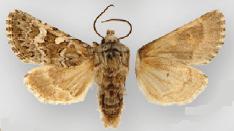
Psammopolia ochracea is a moth of the family Noctuidae. It is found in coastal California between San Francisco and Los Angeles.
This page is based on this
Wikipedia article Text is available under the
CC BY-SA 4.0 license; additional terms may apply.
Images, videos and audio are available under their respective licenses.


